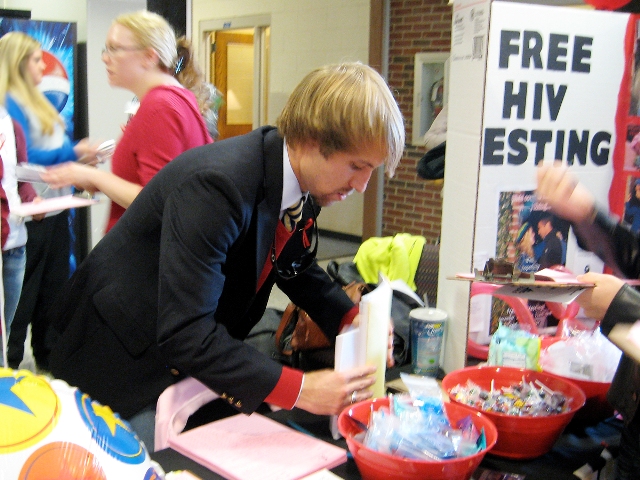They had everything they needed to catch students’ attention on World AIDS Day: sweets, balloons, fliers, great music and plenty of freebies.
Students in Dr. Catherine Crooks’s psychology class at MTSU had a few secret weapons, too, like a full-court-press marketing plan, a partnership with Nashville CARES and free HIV testing with a 20-minute turnaround on Dec. 1.
Working from a party-themed table in the Keathley University Center’s highest-traffic corridor, the students in PSY 4600, Psychosexual Adjustment, enthusiastically offered passers-by information about HIV prevention and escorted fellow students to a suite for testing by Nashville CARES staffers.
Before the five-hour project was over, nearly 300 students had their test results—and counseling suggestions and information—in hand.
“This is the only class that does a testing event as a project,” said a pleased Misty Ellis, youth education coordinator for the Nashville-based HIV/AIDS education and service organization. “This is one of the biggest events of our year. Last year we saw more than 250 students in the single day here at MTSU, so it’s always a huge opportunity for us.”
“I think everybody expects us to be here now,” added Derrin Mitchell, a psychology graduate student who served as one of the class’s project managers. “Dr. Crooks’s classes have been doing this service for about three years, and it’s become the norm. I’ve been surprised how many more people this year have said, ‘Oh, sure, why not? This will save me some time.’ That was our goal.”
The class isn’t formally a part of MTSU’s Experiential Learning initiative, which gives students special credit and recognition for classes offering hands-on learning through practical application and public service. Crooks said, however, that her courses always have an EXL component, and she’s considering adding this one to the program.
“I’ve seen firsthand how successful service learning can be, so I try to incorporate it into every class,” she explained. “The students get a lot more out of the class with a real-life learning opportunity. They work with an organization, they help others and do meaningful work, and they gain applied experience they can always use.”
The students have spent the last few weeks working up publicity plans, wrangling logistics and staffing, learning about HIV, signing confidentiality agreements to ensure testing privacy and setting up social-media outlets and a website (http://freehivtest.weebly.com). On the last day of class, each group will submit project summaries and make a presentation on their accomplishments.
They’ll probably include thanks to MT Lambda, the student organization supporting gay, lesbian, bisexual, transgendered and transsexual people, whose members passed out cupcakes and red ribbons and helpfully directed people to the HIV testing table, and Advocates for Youth, whose candy, cupcakes and condoms helped raise awareness for its “Great American Condom Campaign,” too.





